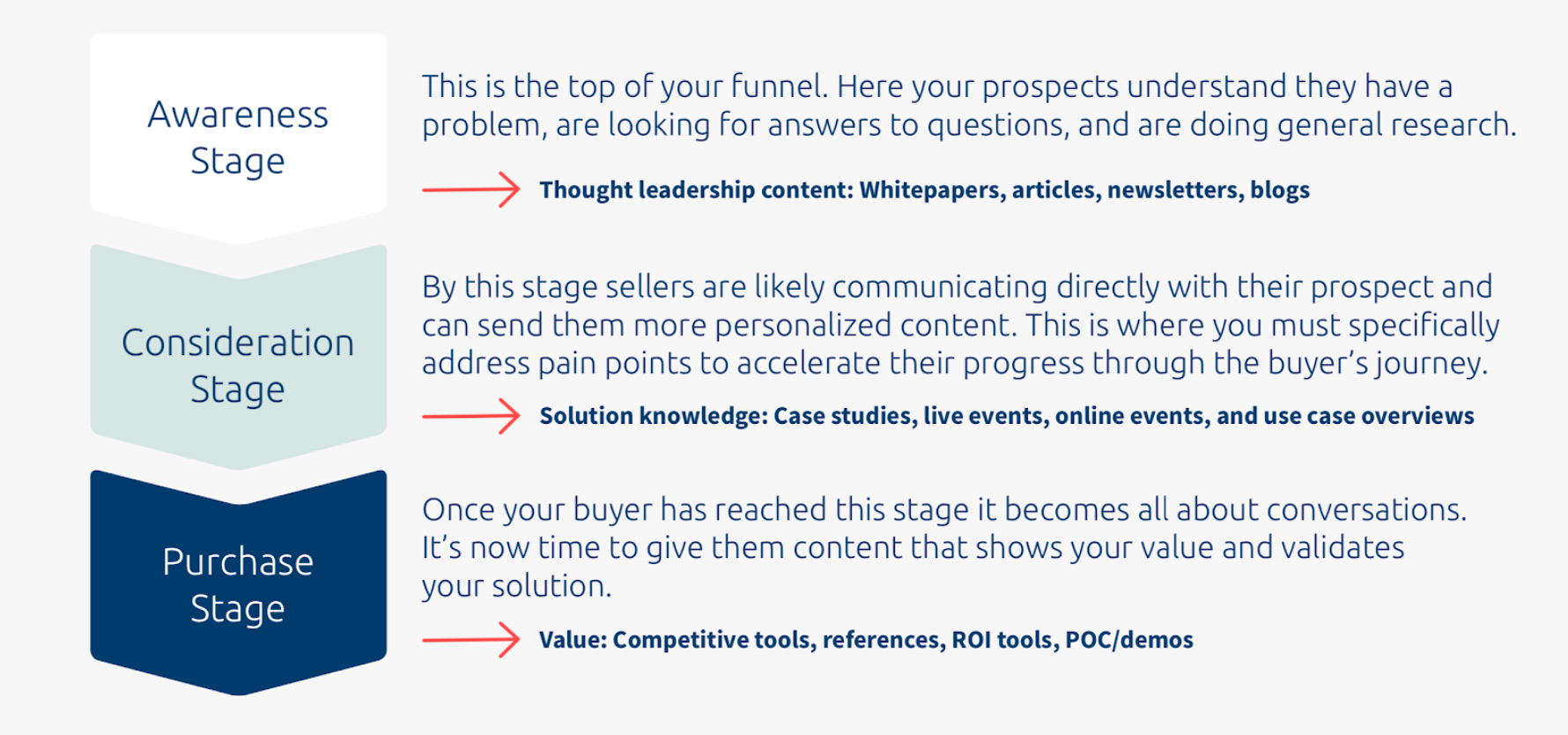When traveling somewhere new, most of us rely on apps like Google Maps to discover the best route to take. These apps also alert us of obstacles we may not have foreseen, even during trips we know like the back of our hand. Similarly, the concept of mapping is essential to effective content and product marketing strategies.
Each stage in the buyer’s journey should be considered a milestone on the trip to becoming a customer. To get more buyers successfully to their destination, marketers must first understand what content is working at each stage and compelling prospects to continue moving forward.
That’s where mapping content comes into play.
Mapping Content Drives Effective Marketing
With 64% of buyers saying that the winning vendor’s content had a significant impact on their buying decision, marketing has to arm salespeople with content that meets buyers where they are and inspires them to act. Mapping content to the buyer’s journey creates a guide for delivering the right content, to the right people, at the right time. Buyers are looking for different information at each stage in the buyer’s journey, so you must create a diverse range of content to answer their questions and communicate your value.

Content is the foundation upon which salespeople share information, expertise, and guidance. The more aligned this content is to each stage, persona, and product use case, the better chance sellers have to engage buyers. Impactful content is the difference between a buyer that moves toward a purchase or a buyer that goes dark.
Today’s buyers have access to endless information and, as a result, they want to engage with sellers who they view as trusted advisors. That’s why high-performing sellers display their knowledge with content that frames the offering through the lens of their buyer’s unique needs. However, mapping content to the buyer’s journey is only the first step — marketers have to audit and then optimize their content to increase their content potency.
Content Audits Highlight Insights
The next step to content effectiveness is performing a regular content audit. Content audits give you an understanding of what content is working, what isn’t, and how to take action. This can take many forms, from archiving old assets to creating new industry-specific case studies. Audit insights are essential to keeping a pristine content library that allows sellers to quickly find relevant content for any situation.
Using a sales enablement tool, you can audit the content that your salespeople commonly use at each stage in the buyer’s journey and identify which of those assets drive high engagement. From there, you can gather insights about top-performing content for each stage and use that data to make more informed decisions. An astounding 65% of marketers have a hard time when it comes to understanding which types of content are effective and which types aren’t. Content audits take the guesswork out of content performance and instead offer clear guidance for how to improve.

Content Optimization Puts Insights into Action
Having insight into content performance doesn’t mean much if it doesn’t inform your decisions. After mapping content to the buyer’s journey and auditing content, you will have visibility into how sellers use and how buyers consume content at every stage of their buying process. With this information, you can identify best practices that give salespeople guidance alongside high-performing content. Sellers can use this intelligence to personalize buyer engagements and more effectively move buyers through the purchase process.
Audit insights and key takeaways should help to shape the editorial and content calendar for the entire marketing team. Once you’re using data to inform content strategy, it’s time to provide the sales team with guidance on how to best use your assets. Data-informed guidance is more essential now than ever, with 53% of customer loyalty being driven by sales reps offering unique and valuable perspectives. Without this knowledge and guidance, sales teams are driving blind.
Valuable insights are left untapped without mapping or auditing content. To learn more about how to optimize your content landscape, download our latest eBook, Mapping and Measuring Content Across the Buyer’s Journey.




